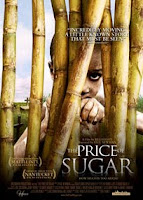
In the Dominican Republic, a tropical island-nation, tourists flock to pristine beaches unaware that a few miles away thousands of dispossessed Haitians are toiling under armed guard on plantations harvesting sugarcane, much of which ends up in U.S. kitchens. They work grueling hours and frequently lack decent housing, clean water, electricity, education and healthcare. Narrated by Paul Newman, The Price of Sugar follows Father Christopher Hartley, a charismatic Spanish priest, as he organizes some of this hemisphere’s poorest people to fight for their basic human rights. This film raises key questions about where the products we consume originate and at what human cost they are produced.
'The Price of Sugar' Movie Review
by Gina Piccalo of THE LOS ANGELES TIMES
October 19, 2007
Nothing sweet about 'The Price of Sugar' - The documentary about Haitian cane workers is stirring up lawmakers and lawyers.
In the new documentary "The Price of Sugar," Haitian immigrants are featured living in medieval squalor and their barefoot children work next to elderly men, cutting sugar cane on Dominican plantations that supply U.S. households. Their remote shantytowns are enforced by barbed wire fences and patrolled by shotgun-wielding guards. There's little medical care and barely enough food to survive.
"There is no death worse than this," a worker named Jhonny Belizaire says in the film.
"The Price of Sugar," which opens today in L.A., isn't the first film to chronicle the plight of the Haitian immigrants in Dominican sugar cane fields. But its influence has been powerful and swift. Since its debut on the film festival circuit last March, the documentary has sparked interest from California's outspoken Haitian advocate Rep. Maxine Waters (D-Los Angeles), and Massachusetts Rep. Jim McGovern (D-Mass.) has requested a copy to screen for the House Human Rights Caucus. Meanwhile, the plantation-owning Vicini family tried to legally block the film's release and, when that didn't work, its Washington lawyers filed a slander suit, claiming the film misleads viewers and includes fabricated scenes.
Directed by Bill Haney, the film chronicles Catholic priest Father Christopher Hartley's dramatic battle to win basic rights for employees of the Vicini family. During the course of his campaign in the film, Hartley wins workers some small victories -- a few cinder-block homes with running water and a tiny pay raise for sugar cane cutters. He recruits American doctors to treat workers and establishes a kitchen to feed hundreds of immigrant children. In the film, Hartley even organizes a strike among the immigrants on 23 plantations, known as "bateyes." Foreign reporters begin to seek him out, and each dispatch muddies the Vicinis' reputation by bringing the Haitians' sad stories to the world.
But his efforts also provoke death threats and inspire nationalism from Dominicans and the nation's media who perceive Hartley's efforts as unfairly biased. They demand to know why Hartley helps illegal immigrants when the jobless Dominicans are themselves are so poor and needy. Strangely, most Dominicans ignore the plantation owners' role. In one episode, machete-toting protestors, who the film asserts were paid by the Vicinis to force Hartley out, gather in the streets and threaten the priest. The film concludes with Hartley vowing never to leave.
thepriceofsugar.com
Voici également un document PDF (16 pages) de l'exposition de photo et du livre Esclaves au Paradis qui fut publié en parallèle avec la parution du film The Price of Sugar : http://www.voiesdelaliberte.be/presse/dp_esclaves-au_paradis.pdf

Aucun commentaire:
Enregistrer un commentaire